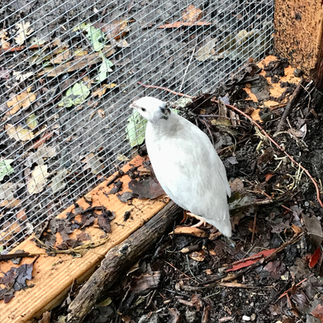The Seven Circles Garden welcomed some new residents recently: 11 baby quail. They’ll earn their keep by providing pest control, fertilizer, and eggs.
Garden teacher Adrienne Wallace bought the birds on Craigslist. She says there are two different kinds, but she’s not sure yet what they are. She knows they aren’t California quail because they don’t have a little plume, or topknot, on their heads. They’re all females (she hopes). They’re about six weeks old. Adrienne’s garden students will help feed them and transport their droppings to the compost pile. They’ll gather up snails from the garden and put them in the coop for the quail to feast on – a gourmet treat! Students helped build the coop, stapling 150 square feet of gopher wire to posts volunteers had put in during our monthly Family Garden Parties. “The coop is large enough to house a lot more quail,” she says, “but we’re starting with these for now.” The yellow structure inside, which Adrienne also bought on Craigslist, is the inner coop. The quail huddle together there to keep warm on chilly days.
All of the quail have names, thanks mainly to our elementary students. Each class named one, the Office staff named one, and Adrienne’s four-year-old daughter, Willow, got to name one “for enduring three hours of travel to pick them up.”
Their names:
First row, left to right: Violet (kindergarten Room 6), Miss Emily (the Office – named after our HR manager, Emily Karakashian), Winter (third grade)
Second row: Leesa (Willow), Cappuccino (fourth grade), Frosty (kindergarten Room 8)
Third row: Strawberry (first grade Room 10), Oreo (second grade), Potato (fifth grade)
Fourth row: Winter (with non-feathered third grader), Snowflake (first grade Room 9), Love (kindergarten Room 7)
Feel free to stop by and welcome the quail to their new home.









































